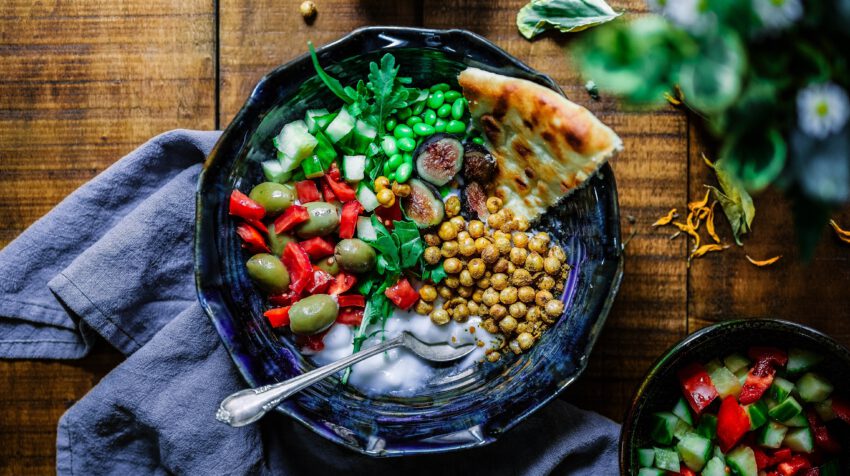It’s a new year folks! Time to make big commitments again!
This month, or actually, its January. Lets make this a new YEAR’s resolution. Because this one will take a while to get into. I don’t think a month is enough time to do it all and decide if you want and can stick with it. So…
This Year, I challenge you to become a climatarian!
What is a climatarian you ask? It is a diet. A life style. The prime focus of the climatarian diet, is to eat with the climate in mind. That means, we eat foods with a small carbon footprint. A nice side effect can be, that you also become more healthy.
And here’s how to achieve a climatarian diet:
- Go as vegan as you can.
- Source your food regionally and seasonally.
- Buy the “raw materials” instead of highly processed foods.
- Waste nothing.
- Cheat by dumpster diving (very optional)
- Keep educating yourself and make conscious choices.
- Give yourself a break. There is no perfect way.
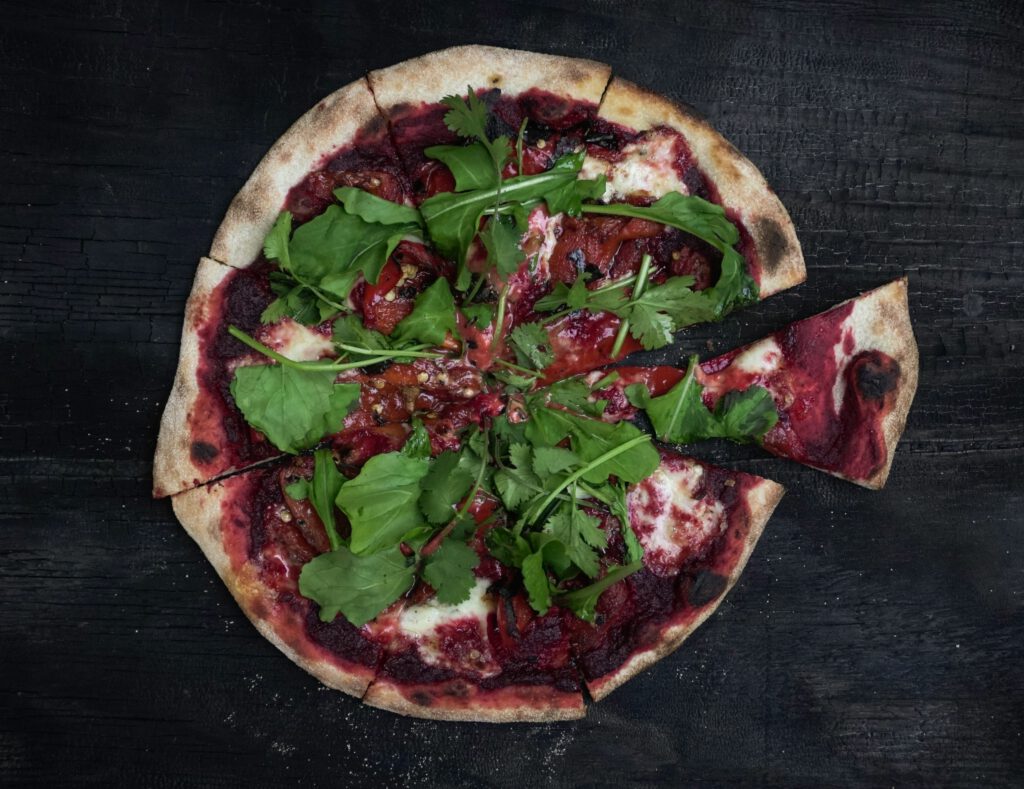
Go as Vegan as You Can
This is the biggest, most important part. If you manage this and nothing else, you’re already a winner.
Why? According to the UN, a whopping 14,5% of the total global emissions are created through animal husbandry. (You need some context? How’s this: The entire continent of Africa contributes only a grand total of 3,5% of global emissions.) What is more, 75% of the agricultural land around the world is used for animal grazing and production of animal fodder (like soy and corn). Only 25% is producing all the other things we humans consume directly (fruit & veg, grains, pulses…). Imagine how much natural habitat would be saved from clear cutting if we could use more of that, already cleared, 75% chunk for plant based nutrition.
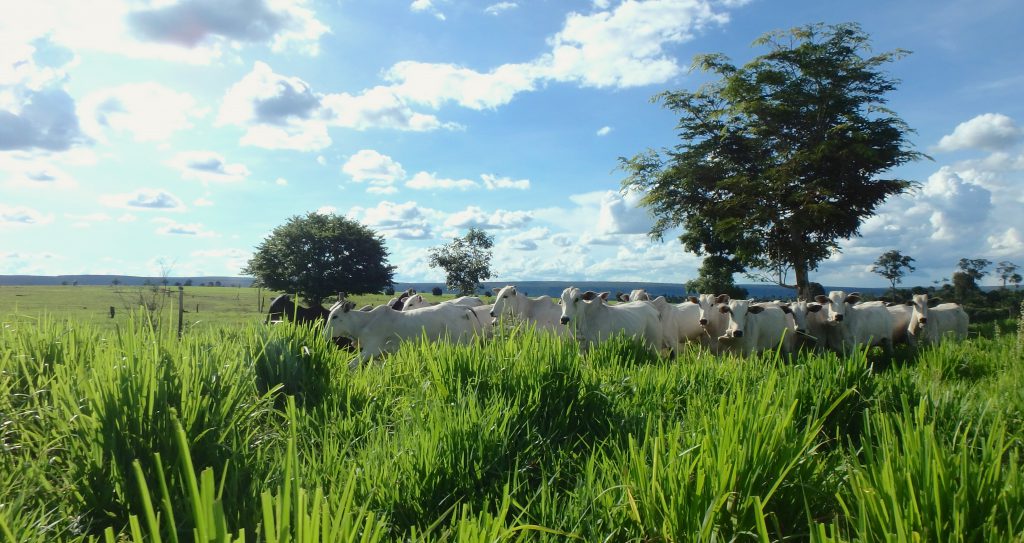
Transitioning your diet can be really hard. And there are so many people with their personal opinions raining down on you. But once you start to get into it, you will probably enjoy it a lot. Especially if you are like me and love trying new foods.
Here’s my story of how I managed the switch to the best of my abilities:
I read a book that left me with no more excuses not to become a vegan. So I decided to go vegan over night. The first day, at 4 pm, I called my boyfriend crying. I had made a smoothie out of berries and water for breakfast, then had to leave the house on an appointment that took much longer than expected. I came home hangry. The only thing I could find in the fridge that was an instant meal and vegan was bread and jam. So I made some and wolfed it down. After I was done, I realized that out of habit I had put butter on the bread as well. That’s when I called the boyfriend in tears complaining about how everything in life just has to be so HARD!! This sweet man had the perfect words as always. He told me to calm down about a teaspoon of butter and recommended that I start slowly, removing and replacing single items from my diet gradually so I had time to adapt and find recipes.
Today, I am happily sort-of-vegan: I eat dumpster-animal products, I eat whats on the table if I am a guest somewhere and I am not too hard on myself in foreign countries.
Speaking of foreign countries: Veganism is easy to do and just as expensive or even cheaper than a meat-lovers diet in Germany, where I live. The market for quick, tasty vegan (junk-) food is growing fast and I have cheap and easy access to all the pulses and tofu I need for a wholesome diet. However, I have seen my fair share of the world and I know for a fact that in many countries veganism is very niche and it may take a while to find or make everything you need without breaking your budget. So, do your best and don’t give up just because your attempts are not perfect. Every little bit counts.
Here is a list of food-blogs that offer vegan recipes that are mostly easy, without hard-to-find ingredients and don’t break the bank.
One special tip: see if its easier to find ingredients for South East Asian cuisine. Asia stores are found almost everywhere and if you stick to the plethora of vegetarian & egg free recipes, you’re automatically eating vegan. Many Indian recipes are also “accidentally” vegan or quite easy to veganise.
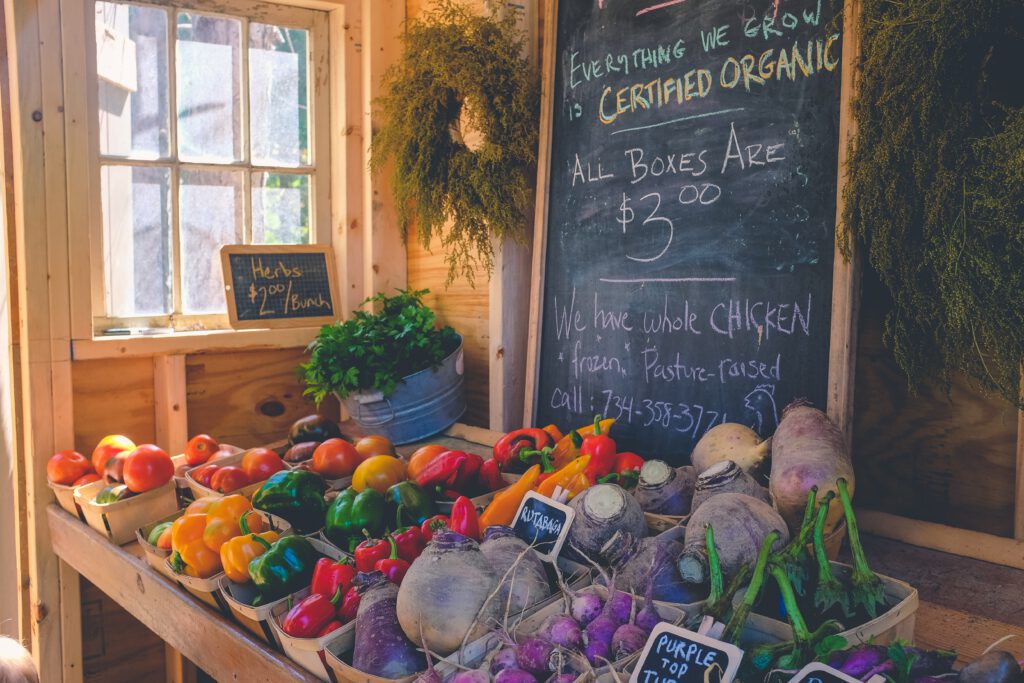
Source Your Food Regionally & Seasonally.
We’ve all heard this one before. Because it is true.
- The closer to you the food is grown, the less time it spends in a truck.
- When you eat what is in season, you make heating and cooling while growing and in storage unnecessary.
The footprint of a strawberry that was flown to Europe from South Africa, so that we can have strawberries on Christmas, is 196x bigger than the footprint of a strawberry that I bought from the local market in my European summer.
So, to master this:
- Support local farmers
- Check on the labels, where your food came from. My personal rule is: I live in Germany and I do not buy food items that come from outside of Europe. When I lived in South Africa, I did not buy items from outside of the country. Some people, they call them selves locavorians, eat nothing that came from more than 100 miles from home.
- If you don’t know what is in season at what time, download a “whats in season” PDF for your local area.
- Additionally, you can have a look for apps like “codecheck” and “yuka” that can tell you how a product was sourced, when you scan it with your phone. In my experience, these apps are still a long way from perfect and there are different ones that work better or worse in different countries. If you have found something that works, I would really appreciate a comment from you!
Buy the “Raw Materials” Instead of Highly Processed Foods.
Its quite straight forward: Here are two carbon footprints to consider:
1kg of potatoes = 38g CO2e
&
1kg of deep freeze potato chips (french fries) = 5kg CO2e
CO2e = “carbon dioxide equivalents”. Not all greenhouse gases are CO2 and all gases differ in their impact on the climate. Methane for example is much more potent than carbon dioxide. So to keep things simple we use equivalents.
How? Well, potatoes are a very simple and low impact crop. There is not much to growing them, digging them up and driving them to the market. For chips however, we must drive them to a factory, have robots wash, peel and cut them, possibly add some extra ingredients (palm oil or spices), bag and freeze the potatoes; and then continuously freeze them while they are trucked to the market and displayed until someone buys them.
You could buy a bag of potatoes (cheaper than processed potatoes) and slice them into chips, drizzle with olive oil, sprinkle some salt and add an optional spring of fresh rosemary or smoked paprika powder and bake in the oven… I would say it takes about 7 minutes longer than ripping open that deep freeze bag – even just taste wise: totally worth it. You can also slice up some onions and throw on top before baking if you want it extra gourmet.
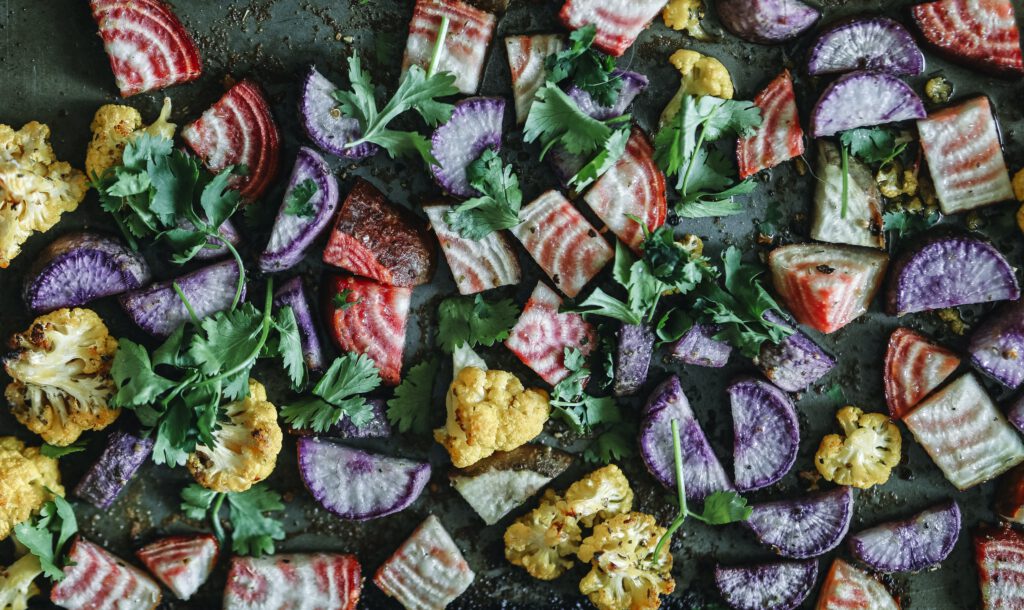
Waste Nothing
If you’ve been following the monthly challenges, chances are, you are already good at the zero food waste thing. Read my guide to zero food waste here.
“Don’t waste electricity, don’t waste paper, don’t waste food. Live the way you want to live but just don’t waste. Look after the natural world, and the animals in it, and the plants in it too. This is their planet as well as ours. Don’t waste them.”
– Sir David Attenborough
Cheat by Dumpster Diving – a.k.a. Freeganism
(Very Optional)
I LOOOOVE meat. All the other animal products were relatively easy to cut out for me. But about once a week, my body craves meat. And I have learned to listen to my body. In these cases, I cheat and consume meat that has been thrown away. I like to smart-ass that “this is not meat from my footprint, but the footprint of the person/company who purchased and threw away the meat.” And I feel a little bit better for the animal that was probably raised with no love or respect, only to be killed. At least, if I pull it out of the dumpster and eat it, this animal will not have lived and died for absolutely nothing.
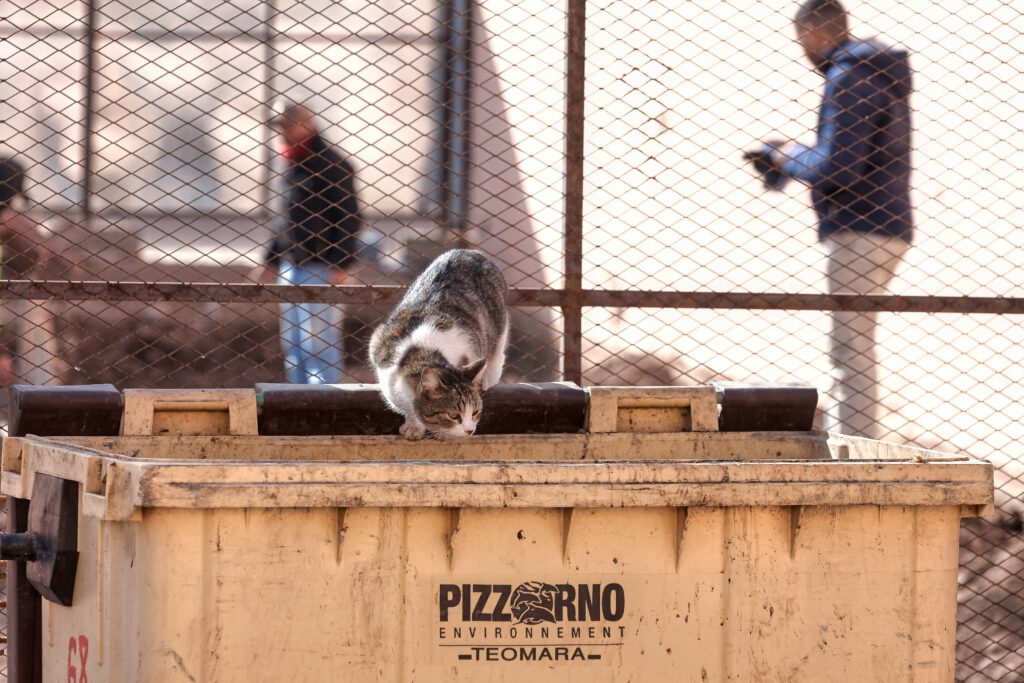
Oh, and of course I use this opportunity to mine for tropical fruit I love so much. There’s no feeling like walking home late at night with a huge tote bag full of avocados you just got for free.
When dumpster diving, please double check the legal situation in your country, don’t get animal products from a dumpster that has been standing in the sun all day, tripple check with all your senses if it is safe to eat and read my post about dumpster diving.
Keep Educating Yourself and Make Conscious Choices
Of course, depending on what is important to you, this diet is very customisable. For example, you may want to buy organic because you are concerned about herbicides etc entering the water, you may want to go package free because you saw that video of the sea turtle with the straw stuck up it’s nose. Or you will choose to boycott certain brands because they violate human rights and/or destruct natural spaces with their operations.
I want to very much recommend this interactive BBC article that illustrates the findings of the famous 2018 Poore & Nemecek study on the environmental impact of our food. It is super interesting and fun to click around in.
Then there are issues of weighing up options. For example, I switched from honey to agave syrup when I went vegan. Then I had a discussion with my partner that the agave plantations are extensive and far away and processing the syrup is probably not super energy efficient. So now I opt for honey from our local beekeeper, who is kind to his bees. (You’d be surprised where you can find local honey. Rooftop beekeeping is a thing now.)
And yes, there is a real risk here of over analyzing and driving yourself insane with ethical choices. And simply not knowing what is the right choice. That is why finally:
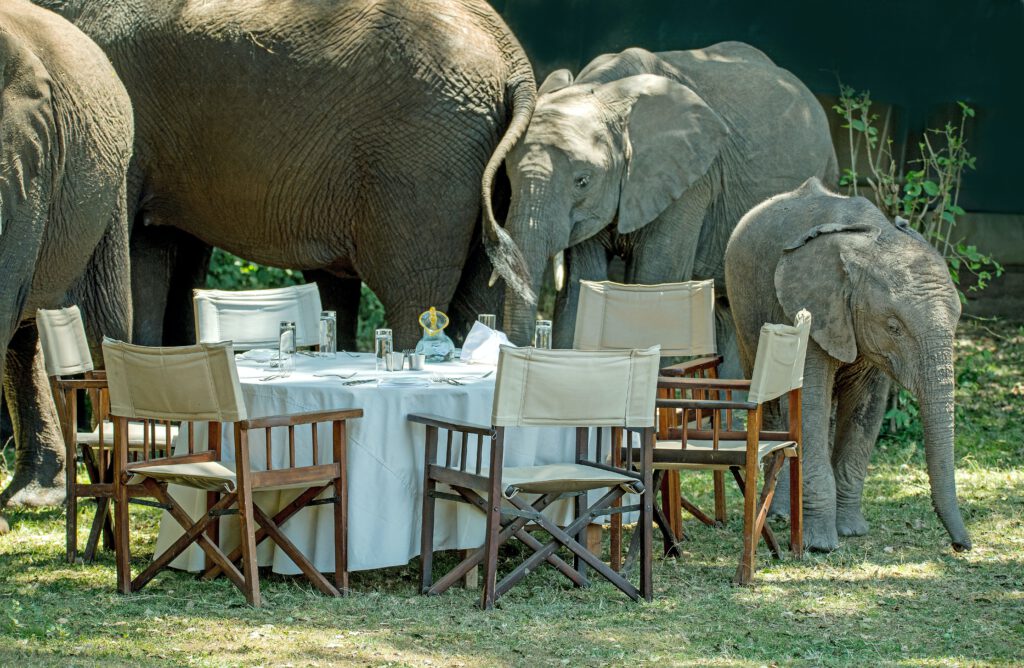
Give Yourself a Break – There is No Perfect Way
Find a level of climatarianism, that you can sustain with a good conscience while not stressing out about it. If you are having fun while staying curious and making small improvements, you’re more likely to stick with it and get better at it than if you focus on what you haven’t achieved yet.
And that my friends is my little bit of advice for you to apply to most things in life. Oh, what the heck, just apply that to everything in life and be happy!
Happy New Year!
*Title Image & roasted veggies by Edgar Castrejon; vegan pizza by Julian Rojas Dättwyler; farmer’s market stand by NeONBRAND; dumpster cat by hp koch; elephants by David Clode.

